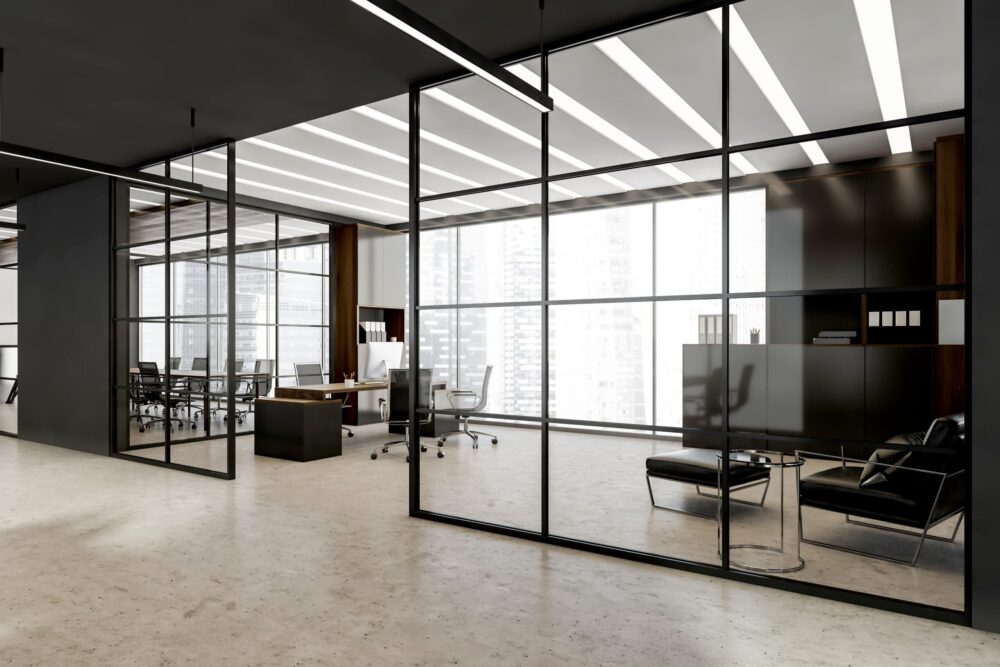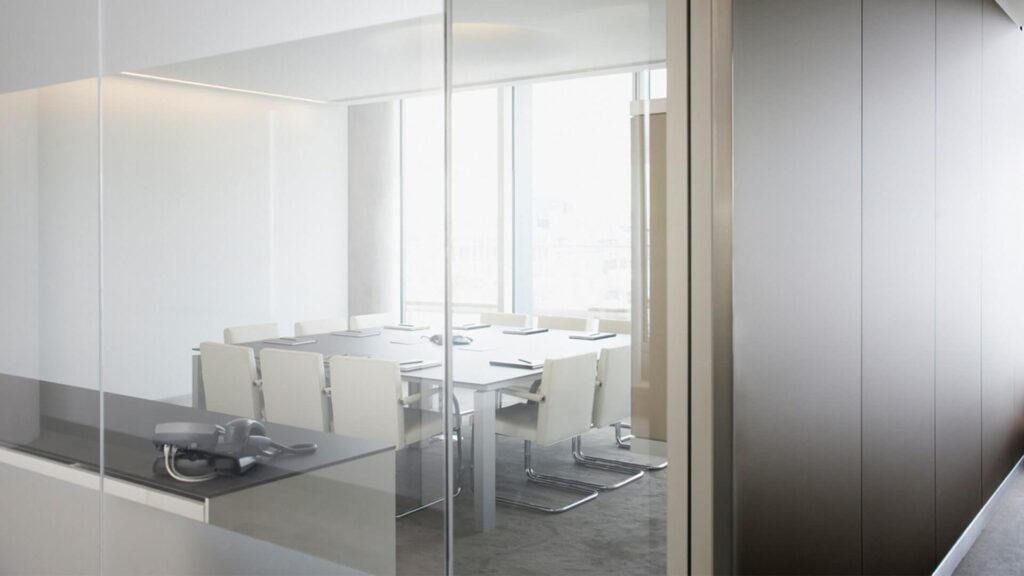Safety and Durability: Choosing the Right Type of Glass for Office Partitions
Transform Your DesignIn modern office design, glass partitions have become a popular choice for creating flexible, open, and visually appealing workspaces. These partitions not only maximize natural light but also offer a sleek, contemporary look that aligns with many architectural trends. However, when selecting glass for office partitions, it’s crucial to prioritize both safety and durability. Choosing the wrong type of glass can pose significant safety risks or lead to costly repairs over time.
Glass partitions provide numerous advantages, such as soundproofing, privacy, and contributing to the overall aesthetic of the workspace. However, with various glass types available, understanding their safety features and durability is essential for ensuring a secure and lasting office environment.
Why Safety and Durability Matter for Office Partitions
The Role of Glass in Office Design
Glass partitions play a pivotal role in influencing both the productivity and design of modern offices. A well-chosen glass type can create an environment that fosters focus, collaboration, and communication. Additionally, glass partitions enable the division of space without the heaviness of solid walls, promoting a more open and inclusive atmosphere.
Ensuring the right type of glass is installed is crucial for maintaining a safe workspace. High-quality glass will withstand daily wear and tear, while also protecting employees from potential hazards. Durability also plays a significant role in determining the lifespan of the partitions, reducing the need for frequent replacements or repairs.
Legal and Safety Standards
When installing glass partitions, companies must adhere to strict legal and safety standards. These regulations include guidelines for shatter resistance, load-bearing capacity, and fire resistance. For example, glass in high-traffic areas must be able to withstand accidental impacts without breaking into hazardous shards.
Additionally, fire safety codes may require certain glass types to provide fire resistance or delay the spread of flames. These legal standards ensure that the glass used in offices not only enhances aesthetics but also complies with safety regulations to protect occupants.
Different Types of Glass for Office Partitions

Tempered Glass
Tempered glass is one of the safest and most durable options for office partitions. It is made by heating and then rapidly cooling the glass, which increases its strength significantly compared to regular glass. If broken, tempered glass shatters into small, dull pieces, reducing the risk of injury.
| Tempered Glass | Pros |
|---|---|
| Strengthened by heat treatment | Durability, heat resistance, ideal for high-traffic areas |
Laminated Glass
Laminated glass consists of two layers of glass with a plastic interlayer that holds the glass together when broken. This feature makes it an excellent choice for safety in offices, as it minimizes the risk of injury from shattered glass. Additionally, laminated glass provides soundproofing and UV protection, making it ideal for areas that require both privacy and noise reduction.
| Laminated Glass | Pros |
|---|---|
| Multiple layers with interlayer | Soundproofing, UV protection, holds together when shattered |
Frosted Glass
For businesses that need privacy without sacrificing natural light, frosted glass is an ideal option. This type of glass has a textured or etched surface that blurs visibility, allowing light to pass through while maintaining confidentiality. Frosted glass is particularly popular in meeting rooms or private offices where discretion is needed.
| Frosted Glass | Pros |
|---|---|
| Textured surface for privacy | Aesthetic appeal, privacy, decorative potential |
Toughened Glass
Toughened glass, like tempered glass, undergoes a thermal process to increase its strength. Its ability to withstand impact makes it a strong contender for durability in busy office spaces. Additionally, toughened glass is scratch-resistant, which helps maintain its appearance even in high-use areas.
| Toughened Glass | Pros |
|---|---|
| Reinforced through thermal processing | Strength, scratch resistance, high impact tolerance |
Smart Glass (Electrochromic Glass)
Smart glass, or electrochromic glass, offers the ability to switch between transparent and opaque states with the touch of a button. This innovation provides flexibility for offices that need to balance privacy with openness. Smart glass is energy-efficient, reducing the need for blinds or curtains and enhancing the modern aesthetic of a workspace.
| Smart Glass | Pros |
|---|---|
| Switches between transparent and opaque | Privacy on demand, energy efficiency, modern appeal |
Factors to Consider When Choosing Glass for Office Partitions
Office Environment and Usage
The choice of glass should be guided by the office environment and how the space will be used. For example, high-traffic areas such as hallways and conference rooms may require tempered or toughened glass to withstand frequent use. On the other hand, areas focused on quiet work might benefit from laminated glass for its soundproofing qualities.
Soundproofing Requirements
Soundproofing is often a critical factor in modern offices, particularly in shared workspaces or meeting rooms. Glass partitions can provide effective sound insulation depending on the glass type. Laminated glass is the most soundproof, while frosted or smart glass can offer a balance between light and sound control.
Maintenance and Cleaning
Different types of glass require varying levels of maintenance. For instance, toughened and frosted glass are generally easier to clean and maintain, while laminated glass may need special care due to its layered structure. Considering ease of cleaning is important in high-use areas to ensure that the glass remains clear and aesthetically pleasing over time.
Customization Options for Glass Partitions

Decorative Films and Patterns
Glass partitions can be customized with decorative films or patterns to enhance office branding or create unique visual elements. These films can provide additional privacy while also contributing to the overall design aesthetic.
Frame Materials and Styles
The frame materials surrounding the glass partitions, such as steel or aluminum, can significantly influence the partition’s durability and style. The combination of different frame materials can improve the safety and strength of the glass while also enhancing its visual appeal.
Cost vs. Value: Investing in the Right Glass
Balancing Budget with Safety
While high-quality glass may come with a higher upfront cost, investing in safety and durability provides long-term value. Tempered and laminated glass, for example, offer superior safety features that justify their price, especially in high-traffic areas where durability is a priority.
Long-Term Durability and Savings
Choosing durable glass can lead to significant cost savings over time by reducing the need for repairs and replacements. Additionally, investing in glass that meets safety standards can prevent accidents, which could result in legal or financial repercussions.
Selecting the right type of glass for office partitions is a critical decision that balances aesthetics, safety, and durability. With options like tempered, laminated, frosted, toughened, and smart glass, businesses can create environments that are both functional and visually appealing. By considering factors such as usage, soundproofing, and maintenance, companies can ensure they make the best choice for their specific office needs. Ultimately, investing in high-quality glass provides lasting value, safety, and a modern touch to any workspace.

